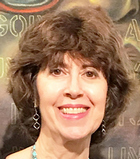Sakena Yacoobi’s Vision for Afghanistan
Sakena Yacoobi is on a mission. Her goal is to bring education to Afghanistan, a country that has a 70 percent illiteracy rate. Her main focus is girls and women. She believes that educating the populace can help to ameliorate the ravages of thirty-five years of war. She speaks with an urgency that emanates from that core conviction. To “build a better future for Afghanistan,” she founded the Afghan Institute of Learning in 1995. “Empowerment” is the key word in all of her NGO’s literature.
Yacoobi, who serves as the Chief Executive of A.I.L., was one of 1,000 women to be nominated as a joint recipient of the 2005 Nobel Peace Prize. She is featured in the new book by Nicholas Kristof and Sheryl DuWunn entitled, Half the Sky: Turning Oppression into Opportunity for Women Worldwide.
A.I.L. has served 6.7 million Afghans. It is managed by women, and is one of the largest employers of Afghan women. It provides health, education, and training based on the philosophy that “educated people, especially educated women and girls, are the key to a peaceful and prosperous future of Afghanistan.” Their American project partner is Creating Hope International.
When Yacoobi sat down to speak with me at the Omega Women and Power Conference, I got a primer on subjects ranging from the history of Afghanistan to the strength and resilience of Afghan women. She outlined the critical situation in her country succinctly, pointing to contributing factors that include a government that is corrupted, negligible services, and starvation. Lack of security is a major problem. She related that every morning people question whether they will return home or if they will be blown up. Yacoobi sees how the despair of poverty and hunger can foster terrorism. She believes that when you create jobs and self-sufficiency, people get involved in rebuilding their society. In a volatile environment of rocket shellings and kidnappings, family breakdown, and the drug trade, Yacoobi qualified the on-the-ground reality stating, “It is a chaotic situation.” Added to this are the reported 10 to 15 million unexploded land mines that are still inside Afghanistan, a territory the size of Texas. This puts Afghanistan at the top of the global landmine casualty list.
Yacoobi considers education the portal to rebuilding her country. In the mid-1990s, she created and implemented a network of eighty underground home schools after the Taliban outlawed education for girls. Currently in her classes she presents the state-sanctioned curriculum, but it co-exists alongside her formatted instruction on “health, peace, democracy, leadership, and being a good citizen.” A.I.L. has trained over 16,000 teachers (70 percent women), provided leadership, administrative and human rights training to 5800 Afghans (80 percent women), and health training to 6400 women. Instruction in carpet weaving, embroidery, knitting, tailoring, and beauty shop management are also taught as vocational skills. “Women’s Learning Centers,” English classes, computer instruction, university classes, and support for grassroots education centers are all part of the plan.
Her health program is ambitious and essential, particular since there is no money for doctors or medicine, and people wait until their situation is critical before they seek attention. Yacoobi has five clinics operating inside of Afghanistan. The country has the second highest maternal mortality rate in the world. Children die at a very young age, as they are born with existing ailments. To fight this, A.I.L. provides services through clinics that are both stationary and mobile – as transportation is an ongoing obstacle. In addition to dealing with basics, there is outreach on HIV/AIDS education, nutrition for children, and dental care.
A strong conviction about the innate intelligence of Afghan women is the underpinning of Yacoobi’s philosophy. She explained how women have always had the power in the household through managing the money and handling the children. “The problem,” she told me, “is that the Western world don’t see that.” Yacoobi talked about the traditional Muslin culture of Afghanistan, which is “thousands of years old.” Referencing the attire of the hijab she said, “Women of Afghanistan wear hijab because they want to. Yes, there was a time during the Taliban that they had it wear [it], but now if they don’t want to, they don’t have it wear it.” Pointing to those outside of Afghanistan who see the garb as oppressive, Yacoobi responds, “And when people come and they want to teach us human rights, when they want to teach us democracy, when they want to teach us all these things, [it is] according to Western culture. And that is not right.”
It is through the precepts and teaching of the Koran that Yacoobi is reframing Afghan women’s call for equality. She emphasized this underscoring, “Here in the Koran it says you don’t abuse women, you don’t beat women.” It is her commitment to work within the tenets of Afghan culture and practices to transform the society into an “advanced civilization.” As she observed, “Once you educate them, you watch how they are performing.”
Yacoobi has hopes that President Obama will have an understanding about the vital need for national infrastructure. It has been acknowledged that one of the problems in training Afghan men to take over their military has been that so few people can read and write. Several times during our conversation, Yacoobi identified herself in a humble way suggesting she was a small person in the global scheme of things. “I try to do the best I can, “ she said.
With her drumbeat for education, health services, and vocational training, her work through A.I.L. constitutes an independent front of pro-active solutions. Hopefully, the powers that be will hear it.
This article originally appeared on the Women’s Media Center website.




